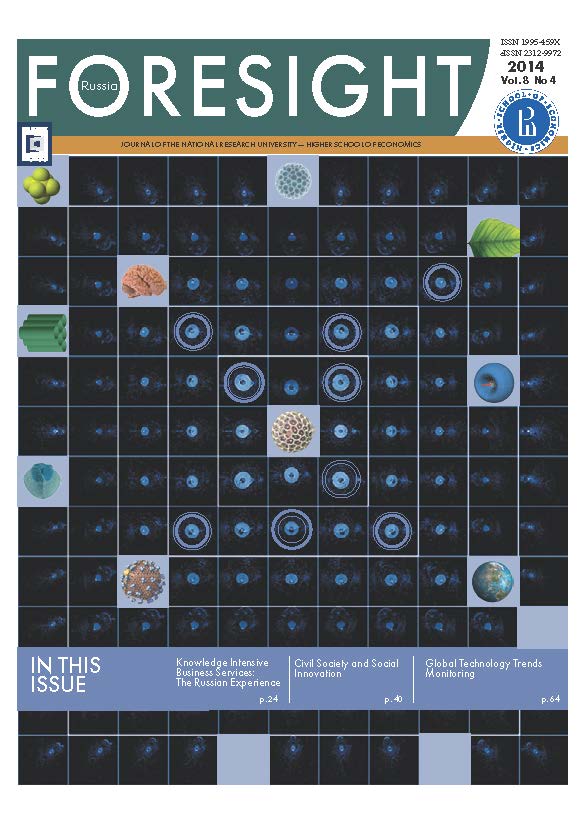Abstract
Knowledge-Intensive Business Services (KIBS) are seen to be a core sector of the so-called ‘knowledge economy’, and already play an important role in developed economies. They a both innovate themselves and provide their clients with knowledge and learning opportunities. This paper examines the status of KIBS in Russia, and explores some key issues in their role in innovation using data from surveys of KIBS firms and their clients in Russia. We note that KIBS are often highly customized, and many new services prove difficult to replicate. KIBS are closely tailored to solving the problems of specific customers, and thus these services typically involve KIBS consumers in a co-production process. Both the formal supplier and the formal user of the service are engaged together in service production, allowing for mutual knowledge transfers and learning. Using KIBS is shown to affect customers’ propensity to innovate, confirming the importance of this sector for the innovation system.
Survey data suggest that the impact on innovation is, as a rule, positive and strong. The propensity to innovate in turn stimulates further consumption of KIBS, which is therefore the start of a self-sustaining growth mechanism of innovation activity. Similar consequences are conceptually associated with knowledge transfer in the course of co-production: consumers get both specialized and general knowledge, improving their skills and increasing the innovative capacities. This enables customers to better understand their own needs and encourages them to consume more customized KIBS in the future, and producing KIBS companies get the opportunity to become effective elements of innovation systems. Authorities should consider the possibility of fostering innovative development by supporting the sector in question.
References
Bettencourt L., Ostrom A., Brown S., Roundtree R. (2002) Client co-production in knowledge-intensive business services//California Management Review. Vol. 44. № 4. Р. 100-128.
Doroshenko M. (2012) How Knowledge-Intensive Business Services Upgrade Their Customers: Evidence from Russia//Exploring Knowledge-Intensive Business Services: Knowledge Management Strategies/Eds. E. di Maria, R. Grandinetti, B. di Bernardo. Basingstoke: Palgrave Macmillan. P. 79-99.
Edler J., Georghiou L. (2007) Public procurement and innovation: Resurrecting the demand side//Research Policy. Vol. 36. P. 949-963.
European Commission (2011) European Competitiveness Report 2011. Luxembourg: Publications Office of the European Union.
European Commission (2014) Employment and Social Developments in Europe 2013. Luxembourg: Publications Office of the European Union.
IMF (1991) A Study of the Soviet Economy (vol. 1). Washington, D.C.: International Monetary Fund.
Langhammer R.J. (2008) Sectoral Distortions and Service Protection in Russia: A Comparison with Benchmark Emerging Markets and EU Accession Candidates//Eastern European Economics. Vol. 46. № 6. P. 70-83.
Miles I. (2005) Knowledge Intensive Business Services: Prospects and Policies//Foresight. Vol. 7. № 6. Р. 39-63.
Miles I. (2012) KIBS And Knowledge Dynamics In Client-Supplier Interaction//Exploring Knowledge-Intensive Business Services Knowledge Management Strategies/Eds. E. di Maria, R. Grandinetti, B. di Bernardo. London: Palgrave.
Satzger G., Schulteß P., Neus A. (2009) Knowledge Intensive Services Procurement Strategy. Karlsruhe: Karlsruhe Service Research Institute.
Schnabl E., Zenker A. (2013) Statistical Classification of Knowledge-Intensive Business Services (KIBS) with NACE Rev. 2 (evoREG Research Note № 25). Karlsruhe: Fraunhofer Institute for Systems and Innovation Research.
Spohrer J., Maglio P. (2008) The Emergence of Service Science: Toward Systematic Service Innovations to Accelerate Co-creation of Value//Production and Operations Management. Vol. 17. № 3. Р. 238-246.
Tether B.S., Hipp C., Miles I. (2001) Standardisation and Particularisation in Services: Evidence from Germany//Research Policy. Vol. 30. P. 1115-1138.
den Hertog P. (2000) Knowledge-intensive business services as co-producers of innovation//International Journal of Innovation Management. Vol. 4. № 4. Р. 491-528.
ГУ-ВШЭ (2010) Индикаторы инновационной деятельности: 2010. Статистический сборник. М.: ГУ-ВШЭ.
Дорошенко M.E., Березин И.С., Виноградов Д.В., Сидорова Н.Б., Суслов А.Б. (2010) Интеллектуальные услуги в России. М.: Беловодье.

This work is licensed under a Creative Commons Attribution 4.0 International License.

